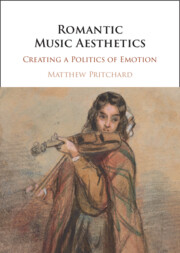Book contents
- Romantic Music Aesthetics
- Romantic Music Aesthetics
- Copyright page
- Contents
- Figures
- Music Examples
- Acknowledgements
- Note on Translation
- Introduction
- 1 Staging Sentimentality
- 2 The Legacy of Rousseau
- 3 The Composer as Genius
- 4 Idealist Aesthetics and the Music Critic
- 5 Picturing the Musical Absolute
- 6 Between Idealism and Realism I: The French Socialists
- 7 Between Idealism and Realism II: After Hegel
- 8 From Hanslick to the Twentieth Century
- Conclusion: The Fate of Feeling
- Bibliography
- Index
Conclusion: The Fate of Feeling
Published online by Cambridge University Press: 22 November 2024
- Romantic Music Aesthetics
- Romantic Music Aesthetics
- Copyright page
- Contents
- Figures
- Music Examples
- Acknowledgements
- Note on Translation
- Introduction
- 1 Staging Sentimentality
- 2 The Legacy of Rousseau
- 3 The Composer as Genius
- 4 Idealist Aesthetics and the Music Critic
- 5 Picturing the Musical Absolute
- 6 Between Idealism and Realism I: The French Socialists
- 7 Between Idealism and Realism II: After Hegel
- 8 From Hanslick to the Twentieth Century
- Conclusion: The Fate of Feeling
- Bibliography
- Index
Summary
The establishment of an objectivist, anti-Romantic tradition in early twentieth-century aesthetics was no purely philosophical breakthrough, nor (as some have argued) a resigned response to the disasters of twentieth-century history, but in significant part an expression of elitism, fascism, and contempt for the masses, one already prominent before 1914. Writers from Schenker to Adorno insisted aggressively on the immanent structural virtues of master-composers’ scores and the irrelevance, or danger, of listeners’ own feelings. The same music-analytical prejudices still vitiate many contemporary attempts within the so-called ‘affective turn’ to theorize emotions and their history in music, not just in musicology but also in psychology. The very end of the book turns toward popular music and cultural studies as more productive embodiments of affective relationality, showing the resonances and continuities these possess with the sentimental-Romantic traditions explored in the book’s chapters.
Keywords
- Type
- Chapter
- Information
- Romantic Music AestheticsCreating a Politics of Emotion, pp. 219 - 236Publisher: Cambridge University PressPrint publication year: 2024

